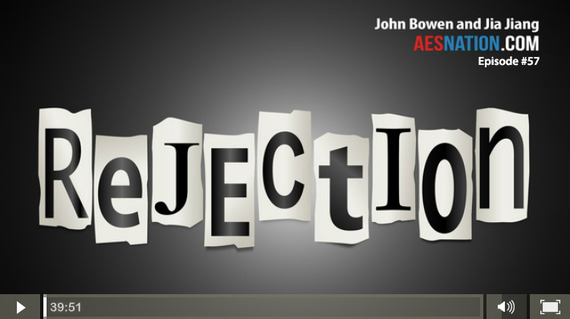I don't care how experienced an entrepreneur you are -- rejection hurts. Nobody likes being told no when it comes to their business. But instead of hiding from rejection, what if you could actually use its benefits to become even better at what you do?
That's exactly what Jia Jiang, an entrepreneur, speaker and the author of Rejection Proof, has done by inviting rejection into his life. Here's his story -- and how you can learn to harness the power of rejection in your own entrepreneurial life.
The quest for rejection
Jiang's quest began after he quit his lucrative tech job to pursue his dream of becoming an entrepreneur. He spent a few months building a team and courting investors for his social app called Hooplus. When a big investor who seemed like a shoe-in ultimately backed out, Jiang was crushed. "I thought I was ready for rejection but I wasn't," he says. "It hit me so hard to a point that I started questioning everything."
Jiang realized that if he was ever going to become a great entrepreneur, he would need thicker skin. He devised a plan: Spend 100 consecutive days seeking out rejection by asking strangers to do tasks that Jiang felt sure they would say no to -- and documenting it all on video. "I wanted to see if I could overcome my fear of rejection and desensitize myself to that pain," he says.
For the next 100 days, Jiang approached people on the street and in stores and made odd requests -- from asking a cop to sit in the driver's seat of his police car to attempting to get people to engage in a footrace with him. His efforts became viral sensations on Youtube, with more than six million views.
The five lessons of rejection
So what exactly can we as entrepreneurs learn by inviting rejection into our lives? Here are five powerful business lessons that Jiang came away with from his 100-day experiment:
1. Great ideas are often dismissed initially. Think about how many times you encounter rejection. You get stonewalled by a potential client, or maybe even a team member or partner who tells you your idea will never fly. Get rejected enough and you may decide it's a plan not worth pursuing. Not necessarily so, says Jiang. "The really creative ideas out there will encounter rejection because even though we say we love creativity, we are biased against it. If you present something truly creative, someone is sure to say it's the dumbest idea they've ever heard."
Consider, for example, Nobel Prize laureate Barry Marshall, who was laughed at and ostracized by the medical community when he first discovered an unconventional cure for stomach ulcers. Or the iPod, which propelled Apple into the most valuable company in the world but which was met with very mixed reviews when it first came out. "The greatest ideas in the world and the best products often started as something crazy that someone else shot down," says Jiang.
2. Rejection is just an opinion -- not a fact. The most successful entrepreneurs don't treat rejection as truths, but rather as opinions. If you can think about rejection in this way, you can start removing some of the emotional pain that accompanies rejection and view it in a more dispassionate and useful manner.
3. Use rejection to fire yourself up and improve your game. Once you view rejection the right way -- as an opinion and not a final decision against you personally -- you can leverage rejection for feedback and motivation that will improve your product or service. Think of Michael Jordan, who used all the rejection he encountered early on from basketball coaches and others as motivation to excel.
Another great example: Steven Spielberg. A few years ago when developing the movie Lincoln, he was told "no" by the one actor he most wanted to play the title role -- Daniel Day Lewis. Instead of walking away, Hollywood's biggest director listened to Lewis's issues with the script and ended up rewriting the movie. Ultimately, he got Lewis on board and the movie was nominated for best picture. "If Steven Spielberg can use rejection as feedback -- a learning tool to improve his product -- why shouldn't we?" asks Jiang.
4. Don't be afraid to go big. Jiang expected to hear "no" every day during his experiment. And while he was denied plenty of times, he was surprised by how many people were willing to go along with his requests and ideas. One favorite example was when Jiang showed up on a stranger's doorstep with a soccer ball asking to play in the backyard, and was invited to do so.
That moment reveals an important strategy for overcoming rejection: If an idea is big or bold enough -- and you're confident enough about it -- people's innate curiosity can get them to say yes. "I asked the man why he would let me do this and he replied that my request was so off the wall that he couldn't say no," says Jiang. "There are a lot of levers we can pull to get our ideas heard and accepted."
The upshot: Don't be afraid to go for it, even with people you don't know as well as you'd like. Otherwise you risk missing opportunities to make great things happen.
5. Rejection is better than regret. Jiang believes that the pain from the "no" you might hear by going for it is nothing compared to the disappointment you'll feel if you never take the chance. "If I'm rejected by the world, I can live with that. But I can't live with not trying and essentially rejecting myself because of fear."
Check out AES Nation every day for bold insights and actionable advice from elite entrepreneurs who have achieved huge success.
